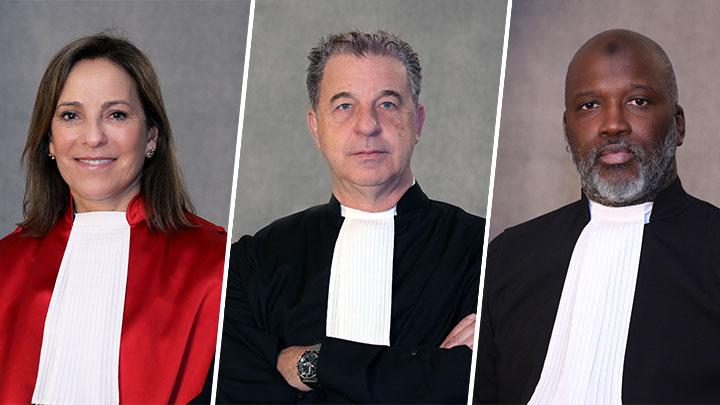Mechanism Principals participate in conference on “30 years of the ICTY – legacy and challenges” in Sarajevo

Over the last two days, the Principals of the International Residual Mechanism for Criminal Tribunals (Mechanism), President Graciela Gatti Santana, Prosecutor Serge Brammertz, and Registrar Abubacarr M. Tambadou, participated in a conference entitled “30 years of the ICTY – legacy and challenges” in Sarajevo, Bosnia and Herzegovina (BiH).
Organised by the Association of Victims and Witnesses of Genocide and the Association “Movement Mothers of Srebrenica and Žepa Enclaves”, the conference focused on various aspects of the legacy of the International Criminal Tribunal for the former Yugoslavia (ICTY). It brought together a number of current and former Judges and Prosecutors of the Mechanism and the ICTY who have played a critical role in delivering justice over the last three decades, as well as legal professionals and local prosecutors, representatives of the media and civil society, academics, victims, witnesses, students and others.
The conference was opened by Mrs. Munira Subašić, President of the Association “Movement Mothers of Srebrenica and Žepa Enclaves”, and H.E. Dr. Denis Bećirović, Member of the Presidency of BiH. All three Mechanism Principals then delivered remarks during the introductory session, which also included remarks from Mr. Christian Schmidt, High Representative for BiH and Mr. Johann Sattler, Head of the Delegation of the European Union (EU) to BiH and EU Special Representative in BiH.
In her opening remarks, President Gatti Santana recalled that, against all odds, the ICTY went beyond developing substantive law and procedure, and helped to create a new legal culture where combatting impunity can be achieved so long as the international community provides the necessary support. While acknowledging that the justice delivered has not been perfect, she affirmed in unequivocal terms that “this justice has been fair, effective, and has contributed to an appreciation of the suffering across Bosnia and Herzegovina during the conflict in the 1990s, not only for the direct victims of crime and their families, but also for the benefit of future generations.” The President concluded by stating: “While the ICTY played a vital role by independently establishing the truth about many crimes perpetrated across the region, this cannot replace the need for affected communities to grapple with how best to achieve reconciliation, both at the local level and especially on the political plane.”
Reflecting on some of the key achievements of ICTY, Prosecutor Brammertz stated, “We demonstrated that accountability for the most serious international crimes is possible, while also leaving as our legacy a record of what occurred.” While noting the completion of the last ICTY case by the Mechanism this year, Prosecutor Brammertz emphasised that this did not mean the end of the accountability efforts, as his office continues to provide extensive assistance to prosecutors in the region, at their request. He concluded his remarks by saying: “Today, glorification of convicted war criminals and denial of crimes – including genocide denial – represent the most significant challenges to accountability and reconciliation. Justice and truth – not impunity and denial- are the foundation for reconciliation. That is why I call on the international community to continue to support the accountability process.”
Finally, in discussing the key challenges in current justice and accountability processes, Registrar Tambadou emphasised the importance of prevention mechanisms and stated: “When we do not prevent the commission of mass atrocities, the costs become unbearable. Today, we still continue to pay the price of the failure of prevention mechanisms in the former Yugoslavia.” While underscoring the need to ensure that “Never Again” becomes a meaningful reality through prevention, justice and lasting peace for the people of BiH and the rest of the region, he concluded his remarks on the ICTY’s legacy by quoting Dr. Martin Luther King Jr: ‘True peace is not merely the absence of tension; it is the presence of justice.’
At the end of the introductory session, the President and Prosecutor were awarded a Charter of Justice by the organisers of the conference. Other conference participants, including Judge Carmel Agius, former President of the ICTY and of the Mechanism, also received this award.
This was the fifth conference organised by the victims’ associations in a series focused on the legacy of the ICTY and accountability processes concerning the 1990s conflicts in the former Yugoslavia.